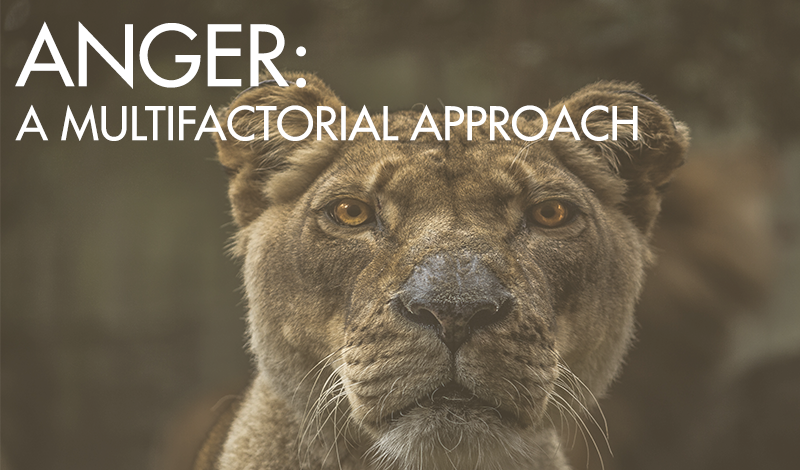
Anger: A Multifactorial Approach
by Darrell Provinse, MA, LPC, NCC, Director and CEO
Anger. What is it?
Anger is a God-given emotion that gives us energy to protect someone else or ourselves, or to take action against an injustice. Anger itself is not wrong. What we do with anger or in anger can be very wrong. Anger can very often signal that something is wrong with us with our relationship, in our psychological life, emotional life, or thought life, etc. Anger is a secondary emotion. Underneath anger, there is usually a variety of other feelings and accompanying thoughts. Among the precursors to anger are the following: fear, frustration, pain, disappointment, shame, guilt, embarrassment, grief, depression, loneliness, fatigue, anxiety, and confusion. Although that’s not an exhaustive list, there are usually several of those present in any single episode of anger or in the case of any individual’s anger.
Anger expressed forcefully is rage. Anger turned inward becomes depression. If held onto, it becomes resentment, and – if held onto for a long period of time – it becomes bitterness.
If you are reading this article, it’s very likely you know somebody who struggles with an inappropriate response to anger and/or you struggle yourself with an inappropriate response to anger. The chances are good that both are true.
Very often, people will convert other feelings such as fear, or worthlessness, or guilt to anger because anger feels more powerful. A lot of times in working with children we’ll say, “It’s easier to be mad than sad.” Anger can often be adaptive in an environment that is itself angry. Sometimes the only way to feel powerful in an angry environment is to become angry themselves. People learn very early on that if our boundaries are being crossed or we’re being hurt, one way to get people to stop, is to become angry. So, if other emotions are viewed as being weak or making a person vulnerable, it becomes reinforced and ultimately, a conditioned response that when any emotion is present that is experienced as anger.
In other environments (e.g., home, work, school, etc.), anger may be viewed as unacceptable. The message may be conveyed either implicitly or explicitly that to be angry is to be a bad person. To be angry is to be identified with an abuser or an abusive situation. So, people convert that anger back to depression or they stuff it inside, and it becomes expressed in other ways. Anger is not only expressed outwardly and overtly, in terms of what is generally considered to be stereotypic angry behavior, but it also can be covert in the form of passive aggressive behavior. It can be manifest in ways such as sarcasm, or malicious gossip, or subtle manipulations, setting someone up to fail, or taking secret delight in another person’s embarrassment. These, too, are forms of expressed anger. Anger may manifest itself as criticism, harshness, or insensitivity. It can, if internalized, also create somatic or body issues for the individual who’s unable to express it appropriately. They may have restless sleep or even insomnia, they may overeat or stop eating, have GI and digestive complaints, autoimmune disorders, including arthritis, lupus, fibromyalgia, etc.
Anger may cause us to be verbally combative, or jump too easily into conflict, or it can cause us to take a victim role and too quickly feel as if we’ve been wronged by others. We may mentally rehearse wrongs or perceived wrongs over and over in our head, reliving past woundedness or slights. We may withdraw or shut down or give someone the silent treatment. We may become easily irritated with others and their shortcomings. In order for us to manage our anger and ultimately deal with it, we need to first acknowledge that we have anger, even if it seems contrary to the image that we have or ourselves or that we would like to portray.
Some therapeutic questions with regard to anger:
- Is it appropriate?
- Is it proportionate?
- How can I deal with it in an appropriate way?
- How do I respond to other people’s anger?
At Agape, we take a multifactorial approach to anger, looking at the feelings that underlie anger, which themselves need to be addressed.
We should then ask ourselves where are those feelings coming from, and if there are any faulty premises on which those feelings are based. For example, shame, guilt, and embarrassment will often cause us to produce anger. If we look closely what we’ll see is that often both pride and insecurity that are at the root of them. We may seek to portray a certain image in order for other people to validate and affirm us, but deep down, we may question whether or not it’s true, and even doubt our self-worth. When that image or self-concept is threatened, our pride becomes threatened and therefore we go to that place of shame, guilt, and embarrassment. The way that we defend against it, is that we convert it to anger.
Depression may not only be a product of anger, but depression may itself produce anger. It then becomes part of a destructive cycle. Depression may be exogenous, which means, externally-based, or it could be endogenous, meaning that it is a product of our biology and/or our thought life. Usually, it’s a mix of both –both the external and the internal. This too can be worked through in a counseling setting and would necessarily need to be addressed if anger seems to be persistent, and depression is seen to be among the causal factors.
Fear is another one. Fear can take many forms. It could be produced by being afraid for one’s physical safety, but more often, it could be the fear of rejection, the fear of abandonment, the fear of the loss of status or of self-esteem. It could be the fear of being hurt or being shamed, etc. When one is fearful, anger is evoked. That anger then makes us feel like we have the energy to act to protect ourselves, but our response may be defensive, and in many circumstances, disproportionate to the event. The more often that someone becomes angry, the more it becomes conditioned or engrained in their personality, and the more difficult it is to change that behavior. While at one time anger might have been adaptive, it is very likely that a person who experiences frequent and explosive anger, or the person who holds onto and stuffs their anger is finding that their coping strategies are no longer effective.
In order to adequately and completely treat the anger, we must look at the whole person. We look at the neuropsychobiological components, i.e. the neurotransmitters. Is there a chemical imbalance? Is there organic depression or bipolar present? Is there ADD, or any other type of organic etiology for the anger? We also look at the biophysical. That would be the other physical elements that may contribute to our emotional state, such as: low blood sugar, chronic physical pain, a thyroid imbalance, hormonal imbalance, lack of exercise, poor sleep habits, malnutrition, exhaustion, etc. All of those things can have a profound effect on our emotions and especially shorten our fuse when it comes to anger. We would also look at our cognitive: what are our beliefs about ourselves and the world? Are our expectations of other people’s behavior realistic? Are our expectations of ourselves realistic? How do we perceive that others view and treat us? Necessarily, one would examine behaviors. What things am I doing that may contribute to my frustration or my exhaustion? Or am I putting myself in circumstances that I know will trigger an anger response? Am I harboring anger, and are my actions feeding into a cycle of social disconnection or conflict? Family of origin and personal history also necessarily must be examined to see what behaviors were modeled for us, what behaviors were learned and acquired as adaptive, often looking at the history of the messages that we have internalized or the pain that we carry.
We believe that the spiritual life is vitally important, and how we view God and how we view ourselves in relation to God necessarily factors into how we view situations and how we respond to them. The holistic therapist would also work with the client to examine their close relationships and how anger factors in, both as a product …how the relationship is affected by anger, and how elements in the relationship may serve to trigger/produce a cycle of anger. Other elements to be examined are the social: What is the individual’s social context? Are they connected? Are they isolated? How do people respond to the individual, and how does the individual perceive their social support system? These are merely a sampling of things that necessarily need to be addressed in order to deal with anger as it is experienced by the individual. I tend to view our emotions as a giant cauldron, and if over time we accrete woundedness and frustrations, guilt, shame, disappointment, inadequacy, confusion, etc., all of that stuff, if it’s not dealt with, remains in that vat or reservoir, and over time if there’s no means of releasing it or working through it, we store it up, which leaves very little room then for when there is a new embarrassment or frustration or emotional wound. In those circumstances, because so many other emotions are present, our threshold of tolerances because quite limited and our reservoir bubbles over with anger. The goal of therapy then should be to not only view the anger as anger and learn how to intercept those underlying feelings that would produce the anger, but also look at what things have been stored in the cauldron and find a way of working through and resolving those so that there is a greater emotional reserve to cope with the many things that life tends to throw our way.
When we examine and address the factors that contribute the anger and the feelings that underlie anger, we will then be better equipped to deal with appropriate anger in a proportionate and responsive way. When, in those circumstances, we encounter a situation in which anger might be triggered, we first look and ask, are we angry on behalf of someone else, or are we angry on behalf of ourselves? Is there an appropriate action to take? Healthy anger can identify a real injustice. Healthy anger can pray rather than plot. Healthy anger will identify a behavior or condition rather than point an accusing or attacking finger at a person. Healthy anger motivates us to assist those who are mistreated. It seeks to instruct rather than destroy the offender. This type of anger has the potential to be unselfish and does not act rashly or merely seek retribution or vengeance. When directed properly, healthy anger motivates the individual to find a solution for a very real problem rather than hold onto the anger that’s produced and allow it to fester.
With the assistance of a trained professional, an individual can seek healing for the underlying unresolved emotions, correct and modify maladaptive behaviors and responses, examine unhealthy relationship patterns and dynamics, and learn to express appropriate anger in a healthy way.
 About the Author
About the Author
Darrell Provinse, LPC, is the Executive Director and CEO at Agape Christian Counseling Services. He is a Licensed Professional Counselor in the state of Missouri. He is certified in Gestalt Therapy as well as Cognitive Behavioral Therapy and extensively trained in Logo Therapy and in family systems. Click on the picture to the left to read his complete bio.





